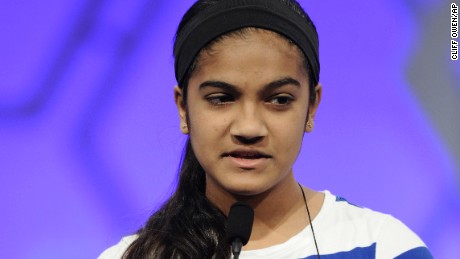Story highlights
- South Asians have won the last eight spelling bees
- Parents push their kids hard on education
- Many kids participate in spelling bees to give them practice
(CNN)While you were out taking your kid to baseball practice or music class, Puthenveedu Jayakrishnan was helping his 12-year-old daughter spell words that don't readily surface in daily life.
Such as "scherenschnitte," and "nunatak," the two winning words in Thursday night's Scripps National Spelling Bee.
Jayakrishnan is among thousands of Indian-American parents who encourage education at home. That could be one reason why South Asian kids have won the spelling bee eight years in a row.
Since 1999, 15 of the 19 winners have been Indian-Americans, including Thursday night's co-winners, Vanya Shivashankar, 13, and Gokul Venkatachalam, 14. In this year's final, six of the remaining seven spellers were "desis," the term commonly used to refer to the South Asian diaspora.
The 2015 victories gave rise again to a flurry of theories about why desi kids perform so well in spelling contests. And no, it's not genetic.
The winners are usually the children of South Asians for whom spelling bees are a prestige activity, says Shalini Shankar, an associate professor of anthropology and Asian-American studies at Northwestern University. Indians do well because immigrants from that country tend to be well-educated, success-driven professionals who take a great interest in their children's learning.
"Parents invest a lot of their time with their kids," she says."They prioritize education and have the economic means to have a parent stay at home. It's much more a socio-economic factor than a gene."
Another big but lesser known factor is a vast South Asian contest network in the United States, says Shankar, who has studied children and spelling bees.
The South Asian Spelling Bee is sponsoring 12 regional contests in June and July leading up to a final round in August. Gokul was the 2014 winner before his stellar performance at Scripps.
Then there's the nonprofit North South Foundation, which runs academic competitions in 35 states with 18,000 participants. Kids start competing in the first grade whereas the youngest Scripps contestants are fourth graders.
Retired Chicago engineer Ratnam Chitturi launched the foundation in 1990s to raise money to educate underprivileged kids in India. But a few years later, friends approached him and asked: What will you do for Indian kids in America?
Chitturi began organizing competitions in spelling, geography, science and mathematics. In the late 1990s, kids who competed in the NSF contests started making it into the final rounds at Scripps. The rest, he says, is history.
"It's just like sports. Like soccer or baseball. Or music," he says. "Practice makes them perfect."
Indian kids begin getting up on stage and spelling in front of audiences at a young age. They gain confidence, get good at it and persevere.
All the Indian-American winners at Scripps, including Vanya and Gokul, were NSF contestants, Chitturi says. A majority of them tried multiple times at Scripps before they came out on top.
The NSF contests also help inspire the kids, Chitturi says, by providing role models, just like in the sporting world.
"They see the winners and think, 'They did it. I can do it, too.'"
In Fresno, California, Jayakrishnan, spends four to five hours a week with his daughter. They spell out words and he puts her through mock contests. Sometimes, his daughter protests.
"How will spelling help me?" she asks. "I have a spell checker on my computer."
"It's for your benefit," Jayakrishnan tells her. "Learn the root, the origin of a word. If you go through this at an early age you will grow as an individual and succeed in life."
He's an electrical engineer who emigrated from India nine years ago. His son is studying medicine at Duke University. He wants to make sure his daughter, too, gets into a prestigious college.
That's part of the culture back home in India, a nation of 1.2 billion people and not nearly enough schools. From the time a child enters schools, it's study, study, study.
"Indians are very competitive," Jayakrishnan says.
The dominance of desi kids at Scripps is a point of pride for the community. Indian-Americans make up less than 1% of the U.S. population but their kids represent a much larger percentage of the contestants.
Posts on Twitter reflected that pride. But they can also turn nasty with racist comments about Indian-American victories.
Shankar, the anthropologist, says the spelling bee is another challenge to the way things used to be in the past.
"It provides another opportunity for America to think about what diversity means," she says.
Can you spell M-U-L-T-I-C-U-L-T-U-R-A-L-I-S-M?











































